- Home
- Roald Dahl
Switch Bitch Page 3
Switch Bitch Read online
Page 3
How splendid she would look in my collection! The babies would, of course, fall away from her as they died, but I would stick them on again with glue in more or less their correct positions; and then I would be the proud possessor of a huge female pandinus with her own fourteen offspring on her back! I was extremely pleased. I lifted the killing-box (I could feel her thrashing about furiously inside) and placed it in the boot, together with the net and trowel. Then I returned to my seat in the car, lit a cigarette, and drove on.
The more contented I am, the slower I drive. I drove quite slowly now, and it must have taken me nearly an hour more to reach B'ir Rawd Salim, the halfway station. It was a most unenticing place. On the left, there was a single gasoline pump and a wooden shack. On the right, there were three more shacks, each about the size of a potting-shed. The rest was desert. There was not a soul in sight. The time was twenty minutes before two in the afternoon, and the temperature inside the car was 106deg.
What with the nonsense of getting the water boiled before leaving Ismailia, I had forgotten completely to fill up with gasoline before leaving, and my gauge was now registering slightly less than two gallons. I'd cut it rather fine - but no matter. I pulled in alongside the pump, and waited. Nobody appeared. I pressed the horn button, and the four tuned horns on the Lagonda shouted their wonderful 'Son gia mille e tre!' across the desert. Nobody appeared. I pressed again.
sang the horns. Mozart's phrase sounded magnificent in these surroundings. But still nobody appeared. The inhabitants of B'ir Rawd Salim didn't give a damn, it seemed, about my
friend Don Giovanni and the 1,003 women he had deflowered in Spain.
At last, after I had played the horns no less than six times, the door of the hut behind the gasoline pump opened and a tallish man emerged and stood on the threshold, doing up his buttons with both hands. He took his time over this, and not until he had finished did he glance up at the Lagonda. I looked back at him through my open window. I saw him take the first step in my direction... he took it very, very slowly... Then he took a second step...
My God! I thought at once. The spirochetes have got him!
He had the slow, wobbly walk, the loose-limbed, high-stepping gait of a man with locomotor ataxia. With each step he took, the front foot was raised high in the air before him and brought down violently to the ground, as though he were stamping on a dangerous insect.
I thought: I had better get out of here. I had better start the motor and get the hell out of here before he reaches me. But I knew I couldn't. I had to have the gasoline. I sat in the car staring at the awful creature as he came stamping laboriously over the sand. He must have had the revolting disease for years and years, otherwise it wouldn't have developed into ataxis. Tabes dorsalis they call it in professional circles, and pathologically this means that the victim is suffering from degeneration of the posterior columns of the spinal chord. But ah my foes and oh my friends, it is really a lot worse than that; it is a slow and merciless consuming of the actual nerve fibres of the body by syphilitic toxins.
The man - the Arab, I shall call him - came right up to the door of my side of the car and peered in through the open window. I leaned away from him, praying that he would not come an inch closer. Without a doubt, he was one of the most blighted humans I had ever seen. His face had the eroded, eaten-away look of an old wood-carving when the worm has been at it, and the sight of it made me wonder how many other diseases the man was suffering from, besides syphilis.
'Salaam,' he mumbled.
'Fill up the tank,' I told him.
He didn't move. He was inspecting the interior of the Lagonda with great interest. A terrible feculent odour came wafting in from his direction.
'Come along!' I said sharply. 'I want some gasoline!'
He looked at me and grinned. It was more of a leer than a grin, an insolent mocking leer that seemed to be saying, 'I am the king of the gasoline pump at B'ir Rawd Salim! Touch me if you dare!' A fly had settled in the corner of one of his eyes. He made no attempt to brush it away.
'You want gasoline?' he said, taunting me.
I was about to swear at him, but I checked myself just in time, and answered politely, 'Yes please, I would be very grateful.'
He watched me slyly for a few moments to be sure I wasn't mocking him, then he nodded as though satisfied now with my behaviour. He turned away and started slowly toward the rear of the car. I reached into the door-pocket for my bottle of Glenmorangie. I poured myself a stiff one, and sat sipping it. That man's face had been within a yard of my own; his foetid breath had come pouring into the car... and who knows how many billions of airborne viruses might not have come pouring in with it? On such an occasion it is a fine thing to sterilize the mouth and throat with a drop of Highland whisky. The whisky is also a solace. I emptied the glass, and poured myself another. Soon I began to feel less alarmed. I noticed the watermelon lying on the seat beside me. I decided that a slice of it at this moment would be refreshing. I took my knife from its case and cut out a thick section. Then, with the point of the knife, I carefully picked out all the black seeds, using the rest of the melon as a receptacle.
I sat drinking the whisky and eating the melon. Both very delicious.
'Gasoline is done,' the dreadful Arab said, appearing at the window. 'I check water now, and oil.'
I would have preferred him to keep his hands off the Lagonda altogether, but rather than risk an argument, I said nothing. He went clumping off toward the front of the car, and his walk reminded me of a drunken Hitler Stormtrooper doing the goosestep in very slow motion.
Tabes dorsalis, as I live and breathe.
The only other disease to induce that queer high-stepping gait is chronic beriberi. Well - he probably had that one, too. 1 cut myself another slice of watermelon, and concentrated for a minute or so on taking out the seeds with the knife. When I looked up again, I saw that the Arab had raised the bonnet of the car on the righthand side, and was bending over the engine. His head and shoulders were out of sight, and so were his head and arms. What on earth was the man doing? The oil dipstick was on the other side. I rapped on the windshield. He seemed not to hear me. I put my head out of the window and shouted, 'Hey! Come out of there!'
Slowly, he straightened up, and as he drew his right arm out of the bowels of the engine, I saw that he was holding in his fingers something that was long and black and curly and very thin.
'Good God!' I thought. 'He's found a snake in there!'
He came round to the window, grinning at me and holding the object out for me to see; and only then, as I got a closer look, did I realize that it was not a snake at all - it was the fan-belt of my Lagonda!
All the awful implications of suddenly being stranded in this outlandish place with this disgusting man came flooding over me as I sat there staring dumbly at my broken fan-belt.
'You can see,' the Arab was saying, 'it was hanging on by a single thread. A good thing I noticed it.'
I took it from him and examined it closely. 'You cut it!' I cried.
'Cut it?' he answered softly. 'Why should I cut it?'
To be perfectly honest, it was impossible for me to judge whether he had or had not cut it. If he had, then he had also taken the trouble to fray the severed ends with some instrument to make it look like an ordinary break. Even so, my guess was that he had cut it, and if I was right then the implications were more sinister than ever.
'I suppose you know I can't go on without a fan-belt?' I said.
He grinned again with that awful mutilated mouth, showing ulcerated gums. 'If you go now,' he said, 'you will boil over in three minutes.'
'So what do you suggest?'
'I shall get you another fan-belt.'
'You will?'
'Of course. There is a telephone here, and if you will pay for the call, I will telephone to Ismailia. And if they haven't got one in Ismailia, I will telephone to Cairo. There is no problem.'
'No problem!' I shouted, getting out of the car. '
And when pray, do you think the fan-belt is going to arrive in this ghastly place?'
'There is a mail-truck comes through every morning about ten o'clock. You would have it tomorrow.'
The man had all the answers. He never even had to think before replying.
This bastard, I thought, has cut fan-belts before.
I was very alert now, and watching him closely.
'They will not have a fan-belt for a machine of this make in Ismailia,' I said. 'It would have to come from the agents in Cairo. I will telephone them myself.' The fact that there was a telephone gave me some comfort. The telephone poles had followed the road all the way across the desert, and I could see the two wires leading into the hut from the nearest pole. 'I will ask the agents in Cairo to set out immediately for this place in a special vehicle,' I said.
The Arab looked along the road toward Cairo, some two hundred miles away. 'Who is going to drive six hours here and six hours back to bring a fan-belt?' he said. 'The mail will be just as quick.'
'Show me the telephone,' I said, starting toward the hut. Then a nasty thought struck me, and I stopped.
How could I possibly use this man's contaminated instrument? The earpiece would have to be pressed against my ear, and the mouthpiece would almost certainly touch my mouth; and I didn't give a damn what the doctors said about the impossibility of catching syphilis from remote contact. A syphilitic mouthpiece was a syphilitic mouthpiece, and you wouldn't catch me putting it anywhere near my lips, thank you very much. I wouldn't even enter his hut.
I stood there in the sizzling heat of the afternoon and looked at the Arab with his ghastly diseased face, and the Arab looked back at me, as cool and unruffled as you please.
'You want the telephone?' he asked.
'No,' I said. 'Can you read English?'
'Oh, yes.'
'Very well. I shall write down for you the name of the agents and the name of this car, and also my own name. They know me there. You will tell them what is wanted. And listen... tell them to dispatch a special car immediately at my expense. I will pay them well. And if they won't do that, tell them they have to get the fan-belt to Ismailia in time to catch the mail-truck. You understand?'
'There is no problem,' the Arab said.
So I wrote down what was necessary on a piece of paper and gave it to him. He walked away with that slow, stamping tread toward the hut, and disappeared inside. I closed the bonnet of the car. Then I went back and sat in the driver's seat to think things out.
I poured myself another whisky, and lit a cigarette. There must be some traffic on this road. Somebody would surely come along before nightfall. But would that help me? No, it wouldn't - unless I were prepared to hitch a ride and leave the Lagonda and all my baggage behind to the tender mercies of the Arab. Was I prepared to do that? I didn't know. Probably yes. But if I were forced to stay the night, I would lock myself in the car and try to keep awake as much as possible. On no account would I enter the shack where that creature lived. Nor would I touch his food. I had whisky and water, and I had half a watermelon and a slab of chocolate. That was ample.
The heat was pretty bad. The thermometer in the car was still around 104deg. It was hotter outside in the sun. I was perspiring freely. My God, what a place to get stranded in! And what a companion!
After about fifteeen minutes, the Arab came out of the hut. I watched him all the way to the car.
'I talked to the garage in Cairo,' he said, pushing his face through the window. 'Fan-belt will arrive tomorrow by mail-truck. Everything arranged.'
'Did you ask them about sending it at once?'
'They said impossible,' he answered.
'You're sure you asked them?'
He inclined his head to one side and gave me that sly insolent grin. I turned away and waited for him to go. He stayed where he was. 'We have house for visitors,' he said. 'You can sleep there very nice. My wife will make food, but you will have to pay.'
'Who else is here besides you and your wife?'
'Another man,' he said. He waved an arm in the direction of the three shacks across the road, and I turned and saw a man standing in the doorway of the middle shack, a short wide man who was dressed in dirty khaki slacks and shirt. He was standing absolutely motionless in the shadow of the doorway, his arms dangling at his sides. He was looking at me.
'Who is he?' I said.
'Saleh.'
'What does he do?'
'He helps.'
'I will sleep in the car,' I said. 'And it will not be necessary for your wife to prepare food. I have my own.' The Arab shrugged and turned away and started back toward the shack where the telephone was. I stayed in the car. What else could I do? It was just after two-thirty. In three or four hours' time it would start to get a little cooler. Then I could take a stroll and maybe hunt up a few scorpions. Meanwhile, I must make the best of things as they were. I reached into the back of the car where I kept my box of books and, without looking, I took out the first one I touched. The box contained thirty or forty of the best books in the world, and all of them could be re-read a hundred times and would improve with each reading. It was immaterial which one I got. It turned out to be The Natural History of Selborne. I opened it at random...
'... We had in this village more than twenty years ago an idiot boy, whom I well remember, who, from a child, showed a strong propensity to bees; they were his food, his amusement, his sole object. And as people of this cast have seldom more than one point of view, so this lad exerted all his few faculties on this one pursuit. In winter he dozed away his time, within his father's house, by the fireside, in a kind of torpid state, seldom departing from the chimney-corner; but in the summer he was all alert, and in quest of his game in the fields, and on sunny banks. Honey-bees, bumble-bees, wasps, were his prey wherever he found them; he had no apprehensions from their stings, but would seize them nudis manibus, and at once disarm them of their weapons, and suck their bodies for the sake of their honey-bags. Sometimes he would fill his bosom, between his shirt and his skin, with a number of these captives, and sometimes confine them to bottles. He was a very merops apiaster, or bee-bird, and very injurious to men that kept bees; for he would slide into their bee-gardens, and, sitting down before the stools, would rap with his fingers on the hives, and so take the bees as they came out. He has been known to overturn hives for the sake of honey, of which he is passionately fond. Where metheglin was making, he would linger round the tubs and vessels, begging a draught of what he called bee-wine. As he ran about, he used to make a humming noise with his lips, resembling the buzzing of bees...'
I glanced up from the book and looked around me. The motionless man across the road had disappeared. There was nobody in sight. The silence was eerie, and the stillness, the utter stillness and desolation of the place was profoundly oppressive. I knew I was being watched. I knew that every little move I made, every sip of whisky and every puff of a cigarette, was being carefully noticed. I detest violence and I never carry a weapon. But I could have done with one now. For a while, I toyed with the idea of starting the motor and driving on down the road until the engine boiled over. But how far would I get? Not very far in this heat and without a fan. One mile, perhaps, or two at the most...
No - to hell with it. I would stay where I was and read my book.
It must have been about an hour later that I noticed a small dark speck moving toward me along the road in the far distance, coming from the Jerusalem direction. I laid aside my book without taking my eyes away from the speck. I watched it growing bigger and bigger. It was travelling at a great speed, at a really amazing speed. I got out of the Lagonda and hurried to the side of the road and stood there, ready to signal the driver to stop.
Closer and closer it came, and when it was about a quarter of a mile away, it began to slow down. Suddenly, I noticed the shape of its radiator. It was a Rolls-Royce! I raised an arm and kept it raised, and the big green car with a man at the wheel pulled in off the road and stopped beside my Lag
onda.
I felt absurdly elated. Had it been a Ford or a Morris, I would have been pleased enough, but I would not have been elated. The fact that it was a Rolls - a Bentley would have done equally well, or an Isotta, or another Lagonda - was a virtual guarantee that I would receive all the assistance I required; for whether you know it or not, there is a powerful brotherhood existing among people who own very costly automobiles. They respect one another automatically, and the reason they respect one another is simply that wealth respects wealth. In point of fact, there is nobody in the world that a very wealthy person respects more than another very wealthy person, and because of this, they naturally seek each other out wherever they go. Recognition signals of many kinds are used among them. With the female, the wearing of massive jewels is perhaps the most common; but the costly automobile is also much favoured, and is used by both sexes. It is a travelling placard, a public declaration of affluence, and as such, it is also a card of membership to that excellent unofficial society, the Very-Wealthy-Peoples Union. I am a member myself of long standing, and am delighted to be one. When I meet another member, as I was about to do now, I feel an immediate rapport. I respect him. We speak the same language. He is one of us. I had good reason, therefore, to be elated.
The driver of the Rolls climbed out and came toward me. He was a small dark man with olive skin, and he wore an immaculate white linen suit. Probably a Syrian, I thought. Just possibly a Greek. In the heat of the day he looked as cool as could be.
'Good afternoon,' he said. 'Are you having trouble?'
I greeted him, and then bit by bit, I told him everything that had happened.
'My dear fellow,' he said in perfect English, 'but my dear fellow, how very distressing. What rotten luck. This is no place to get stranded in.'
'It isn't, is it?'
'And you say that a new fan-belt has definitely been ordered?'

 My Uncle Oswald
My Uncle Oswald The Best of Roald Dahl
The Best of Roald Dahl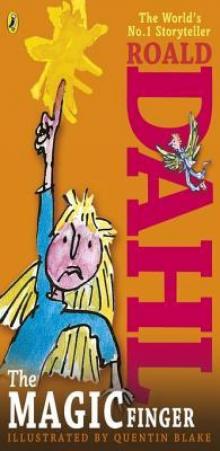 The Magic Finger
The Magic Finger Charlie and the Chocolate Factory
Charlie and the Chocolate Factory Fantastic Mr Fox
Fantastic Mr Fox Matilda
Matilda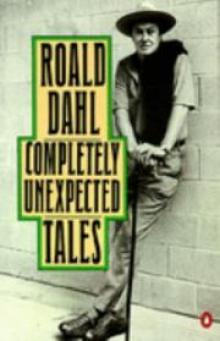 Completely Unexpected Tales: Tales of the Unexpected. More Tales of the Unexpected
Completely Unexpected Tales: Tales of the Unexpected. More Tales of the Unexpected The Wonderful Story of Henry Sugar and Six More
The Wonderful Story of Henry Sugar and Six More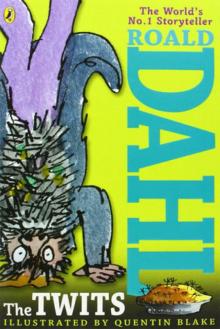 The Twits
The Twits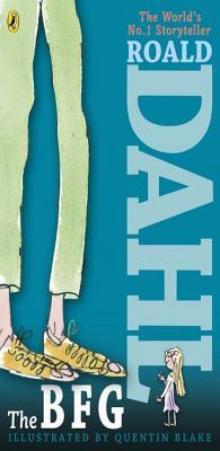 The BFG
The BFG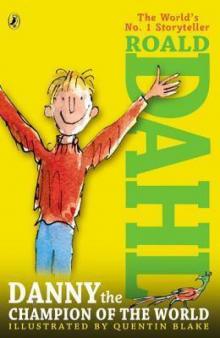 Danny the Champion of the World
Danny the Champion of the World The Witches
The Witches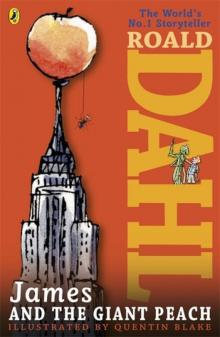 James and the Giant Peach
James and the Giant Peach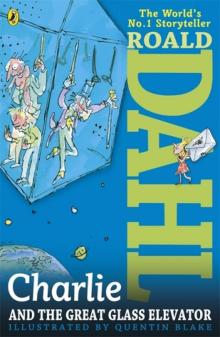 Charlie and the Great Glass Elevator
Charlie and the Great Glass Elevator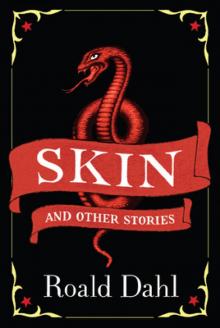 Skin and Other Stories
Skin and Other Stories Kiss Kiss
Kiss Kiss Switch Bitch
Switch Bitch The Giraffe and the Pelly and Me
The Giraffe and the Pelly and Me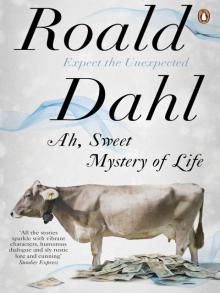 Ah, Sweet Mystery of Life
Ah, Sweet Mystery of Life Fear
Fear The Great Automatic Grammatizator and Other Stories
The Great Automatic Grammatizator and Other Stories Someone Like You
Someone Like You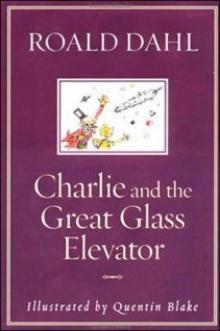 Charlie and the Great Glass Elevator c-2
Charlie and the Great Glass Elevator c-2 More About Boy
More About Boy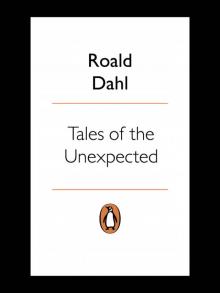 Tales of the Unexpected
Tales of the Unexpected The Umbrella Man and Other Stories
The Umbrella Man and Other Stories Dirty Beasts
Dirty Beasts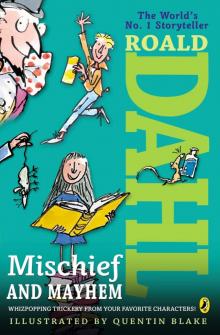 Roald Dahl's Mischief and Mayhem
Roald Dahl's Mischief and Mayhem The Collected Short Stories of Roald Dahl, Volume 1
The Collected Short Stories of Roald Dahl, Volume 1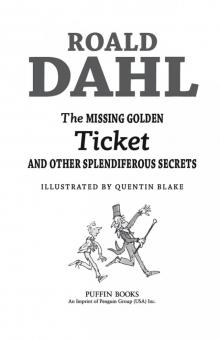 The Missing Golden Ticket and Other Splendiferous Secrets
The Missing Golden Ticket and Other Splendiferous Secrets Billy and the Minpins
Billy and the Minpins Over to You
Over to You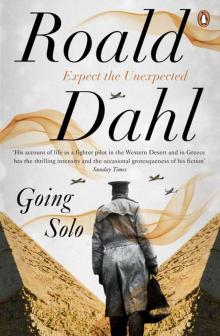 Going Solo
Going Solo Deception
Deception War
War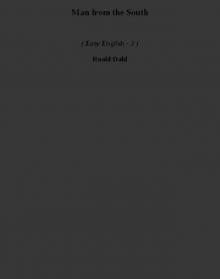 Man from the South ee-3
Man from the South ee-3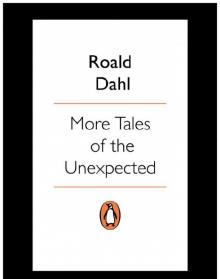 More Tales of the Unexpected
More Tales of the Unexpected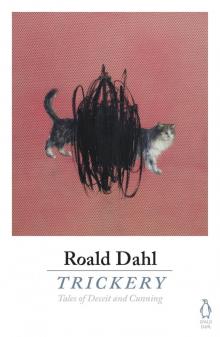 Trickery
Trickery Rhyme Stew
Rhyme Stew Charlie and the Chocolate Factory (Puffin Modern Classics relaunch)
Charlie and the Chocolate Factory (Puffin Modern Classics relaunch)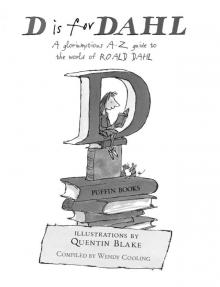 D is for Dahl
D is for Dahl Roald Dahl Whoppsy-Whiffling Joke Book
Roald Dahl Whoppsy-Whiffling Joke Book Spotty Powder and other Splendiferous Secrets
Spotty Powder and other Splendiferous Secrets Charlie and the Chocolate Factory c-1
Charlie and the Chocolate Factory c-1 Boy
Boy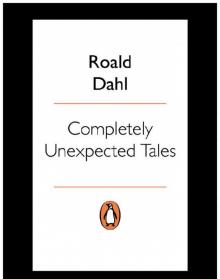 Completely Unexpected Tales
Completely Unexpected Tales Madness
Madness Innocence
Innocence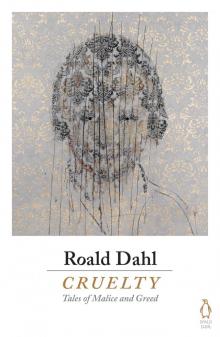 Cruelty
Cruelty George's Marvellous Medicine
George's Marvellous Medicine